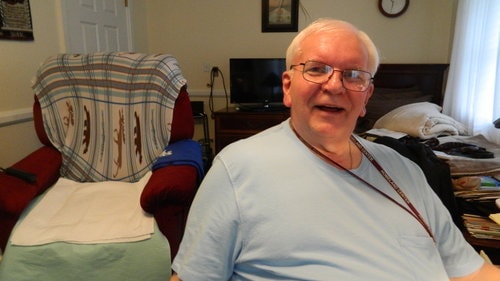Resident Spotlight: For Jim Phillips, cooking is love
 Many people cook for fun, or because they must. Jim Phillips, though, believes that cooking “can become a means of worship.”
Many people cook for fun, or because they must. Jim Phillips, though, believes that cooking “can become a means of worship.”
The Homeland resident has spent his life on a spiritual quest entwined with cooking as a ministry, whether he’s preparing meals for a few friends or hundreds of people.
Jim grew up in Ohio, raised by foster parents after the death of his mother. When glaucoma took his foster mother’s sight, she would sit in the kitchen doorway and coach Jim through the steps of making the family dinner.
“She would ask, ‘Does it look like this? Does it taste like this?’” Jim remembers. “She was like a living cookbook. That’s what began my journey with food.”
After attending Northcentral University in Minneapolis, Jim’s career path wound from counseling troubled teens to buying for department stores, to preparing bank financial statements. But all his life, he had wanted to attend a monastery and he discovered idyllic Holy Cross Monastery, on the banks of the Hudson River.
There, the kitchen became a regular assignment. Every weekend, 140 guests would arrive for contemplative retreats, and Jim “learned by experimentation.”
“They had a refractory, like a dining room, with glass all around, and you could look up the river or down the river,” he said. “Guests loved that.”
Jim also spent time with religious communities in Massachusetts and Illinois. Food was the thread weaving through all his experiences, often in what he calls “rice and beans environments,” where a little creativity could stretch limited food budgets. He learned to use herbs for flavor and how to make “balanced meals without meat and still getting enough protein.”
He always went where he felt God wanted him to go.
“Self-discovery is part of fulfilling God’s plan in our lives,” Jim says. “But certain times, what we do is discover ourselves and then rush off, when the Bible says, ‘I know the plans I have for you.’ Instead of trying to discover what His plan is and let that carry us in a direction, we tend to try to make a path.”
Eventually, Jim came to Central Pennsylvania through friends. He worked as a computer-operations trainer in Hershey Chocolate Co.’s Hershey Kiss department, doing “the simplest job to the most complicated.”
In the meantime, he bought a home and had the idea to host holiday gatherings for the single members of his church.
“We all shared in the turkey my company gave me, and people would bring different items,” he says. “It was a directed pot luck. I had a fireplace and I built a fire. People looked forward to it.”
Among the dishes he prepared was cranberry relish, one of three recipes he contributed to Homeland’s 150th-Anniversary cookbook, “Heritage Recipes from Homeland Center.” He remembers when his mother would throw cranberries in a pot for cooking. “You could hear them pop. You had to have a lid on, or otherwise, you’d have a mess.”
When Jim looked at retirement communities, Homeland felt like the place where God wanted him to live. He moved here around 2013 and has loved it ever since.
“I feel like I have support,” he says. “It’s like a big family. I’m thankful for them.”
He spends his days reading, studying theology, and enjoying meals with his friend Pete Patton, a Homeland resident for more than four years. He teaches at his church, Cornerstone Fellowship in Wormleysburg, and counsels visitors who come to him for spiritual guidance.
For Jim, food “becomes a means to build community.”
“Love can take on a lot of formats, but for people who like food, love can come in food. Apple pie sometimes represents a mother’s love, or a casserole dish can express your concern for the death of a family member. Cooking can become a means of worship. It’s more than a cup and a piece of bread. The sacramental approach spills out into how you live, and cooking for me has been that means.”


